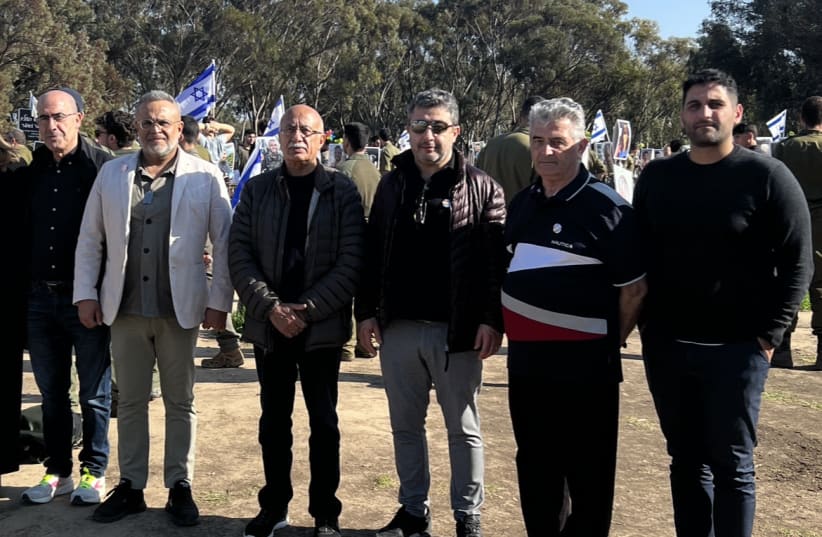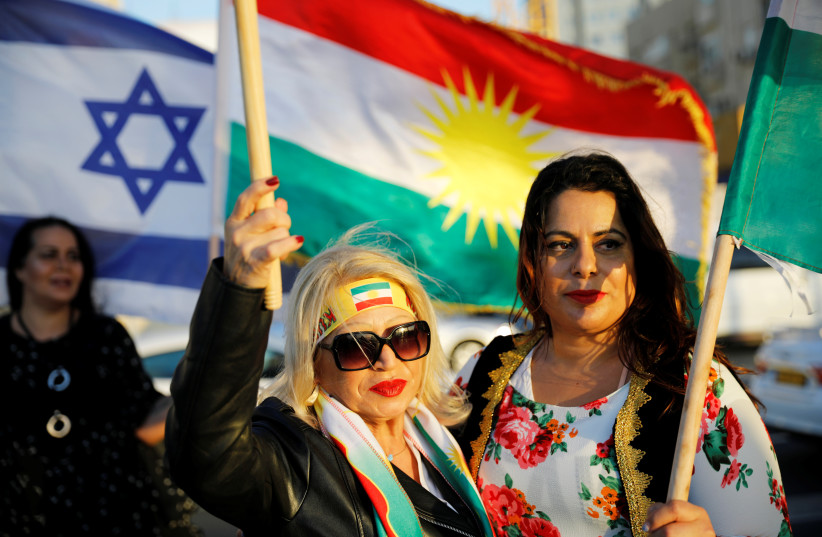The October 7 massacre has led to an outpouring of solidarity with the Jewish victims and Israel among some groups. For instance, Kurdish people in the Middle East have suffered the same types of oppression and violence that Hamas carried out on October 7.
A delegation of Kurdish diaspora organizations, including the Kurdish Community of Germany (Kurdische Gemeinde Deutschland-KGD) and Kurdish Diaspora Confederation (DIKURD) of Kurds from Germany, Denmark, and Austria came to Israel this week to speak about how Kurds have empathy for Jews and Israel. They also to came to see the sites of the October 7 massacre and see other important places.
The head of DIAKURD, Adnan Agacan, stressed that they visited Israel at a challenging time to express the Kurdish solidarity with the Jewish people and the Kurdish sentiments that the Jews are not alone. The Kurds feel the pain and sorrow of Jewish people and stand with them worldwide, he said.
I met with the Kurdish delegation at the Prima Kings Hotel in Jerusalem. It turns out that some of the people there who were evacuated are from communities in the north that have Kurdish Jewish connections. There was a warmth and immediate bond between the refugees who have had to flee Hezbollah and the Kurds. The Kurdish delegation is made up of men and women of different ages who also have a history of fleeing oppression. One of them had ancestors oppressed in Iran, others are from the Kurdistan regions of Iraq, Syria, and Turkey.
There is an instant bond between Jews and Kurds. Many Kurdish people describe facing attacks by extremists in the region and in Europe, the same types of extremists who are linked to groups like Hamas. In addition, they have memories of the 1980s, when regimes like Saddam Hussein’s gassed and massacred Kurds and also sought to attack Israel.
In many cases, Arab nationalists used the same racist rhetoric against Jews and Kurds. Today, Islamist groups do the same, targeting Kurds, Jews, and other minorities. In addition, the regime in Ankara has often bashed Israel and has suppressed Kurds. Kurds also remember that Israel backed their right to independence in a referendum in the Kurdistan region of Iraq in 2017. Iranian-backed militias are also involved in attacks on Kurds in Iraq.
A representative of the DIAKURD, Mehmet Tanriverdi, stated that Jews and Kurds are both peaceful people that live in an environment with hostile neighbors in the Middle East. He added that the friendship between the Jews and Kurds is not only related to their common lived experiences of persecution, suffering, or their common enemies, but also to their aspiration to peace, freedom, and democracy, as well as self-determination and respect for human rights and women’s emancipation. A Kurdish state in the Middle East, for instance, could be crucial for security and peace in the region.
Over dinner at the hotel, the Kurdish delegation discussed how important it was for them to come to Israel. One of them, a leader within the group, described in German how they had decided to come and show solidarity. They traveled to Nir Oz and the site of the Nova festival massacre on February 21. There they saw the horrors inflicted by Hamas. Another member of the delegation asked about the chances of a two-state solution and discussed the regional threats from Iran and its proxies. The head of the KGD, Ali Ertan Toprak, added that the Kurdish question also exposes the antisemitism of the international community.
While the international community and the western states demand a two-state solution from the state of Israel for a few million Palestinian Arabs, creating a 23rd Arab state in the region, they remain silent about the statelessness of over 40 million Kurdish people in the Middle East. This leaves the Kurds at the mercy of authoritarian regimes in Iran and Turkey. This demonstrates the hypocritical and antisemitic approach of the international community, Toprak noted.
Shared suffering between Jews and Kurds, especially at the hands of similar regimes, is important to understanding the Jewish-Kurdish connection. Kurds suffered genocide in Iraq in the 1980s; in Syria the regime sought to Arabize their region and suppress their language and names; in Turkey for many years the regime denied Kurds existed and oppressed their language; and in Iraq the regime has frequently targeted the Kurdish region for oppression.
In the 1990s, the Kurdistan region of Iraq was freed from Baghdad’s attacks with US support. This led to an autonomous region. The Kurdish fighters in Iraq, known as Peshmerga, played a key role in the war on ISIS. Their autonomous region hosts US forces. As such it has been targeted by Iranian proxies in Iraq. In Syria, the US also works with the Syrian Democratic Forces to fight ISIS. The SDF has Kurdish leadership and Kurdish forces within it. Turkey has frequently attacked the SDF.
It’s also worth recalling that Iran’s regime murdered a Kurdish woman, Mahsa Jina Amini, in 2022, setting off protests that grew across Iran.
The Kurdish delegation in Israel visited northern Israel as well and also met with key local intellectuals, leaders, and activists during their trip here.

